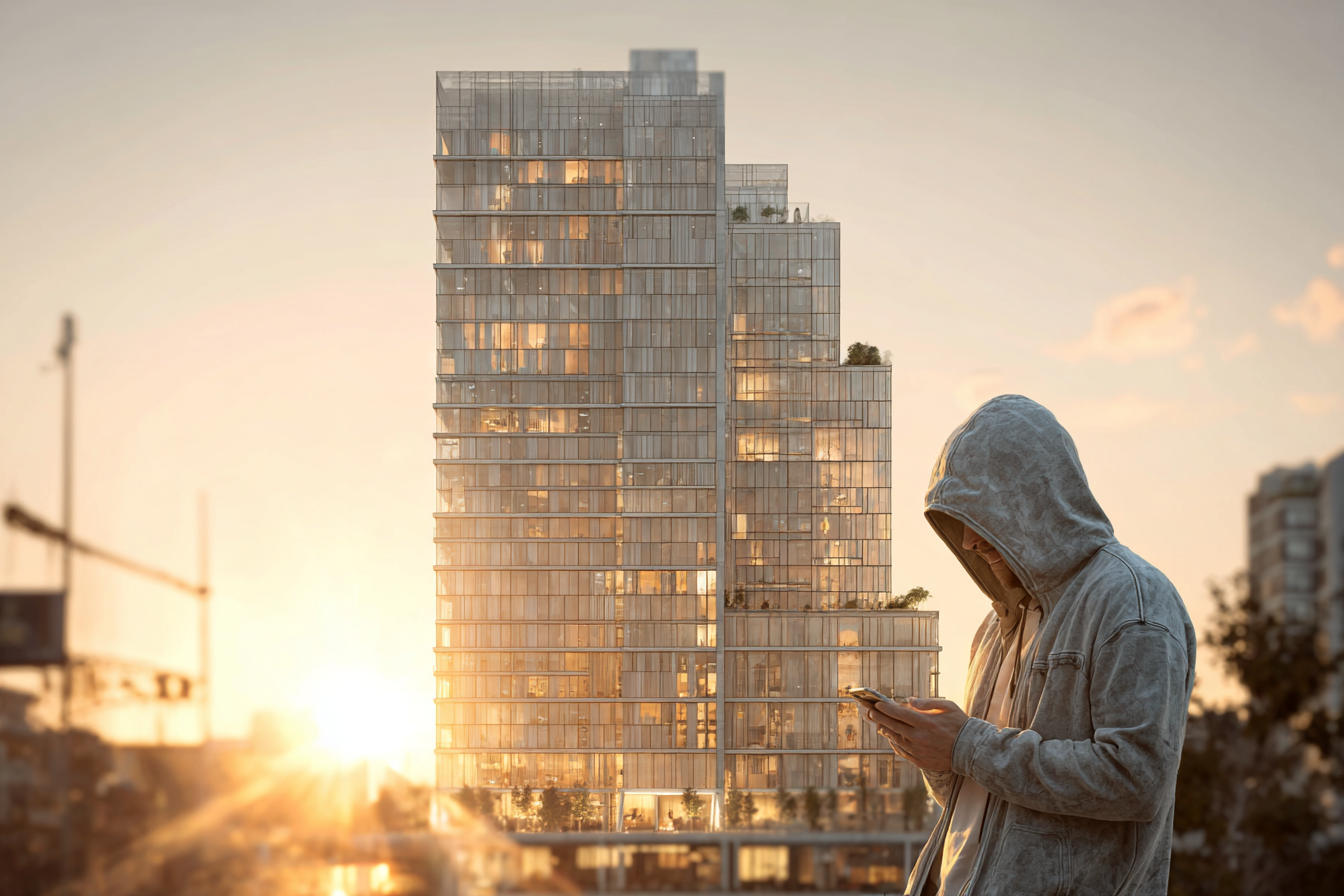This conversation comes from a demo with a developer in Florida — we’ll call him Bryan to protect his privacy.
And just to be clear: if you ever have a demo with us, we don’t snitch!
But I believe demos are incredibly valuable — not just for us, but for everyone in the industry. In these conversations, you can feel the pulse of what really drives real estate: the ambitions, the fears, the habits that hold it back, and the quiet shifts already underway.
Hope you enjoy this one.
Alessia:
Bryan, tell me something — don’t you ever get tired of selling the same dream? Every brochure, every video, every ad looks identical. Infinity pool, champagne at sunset, yoga lady in white linen. Miami, Dubai, New York — all the same film, just different skylines.
Bryan:
(Laughs) You sound like every outsider who thinks we don’t know what we’re doing. But the truth is, it works. Developers spend billions. You don’t gamble with billions. The “dream” is a formula — it’s safe, tested, and universal. That’s not laziness. That’s risk management.
Alessia:
Risk management or imagination management? Because to me, it looks like everyone’s selling the same illusion and calling it strategy.
Bryan:
It’s not illusion, it’s psychology. People don’t buy a unit — they buy identity. They buy the feeling of success. The sunset, the skyline, the ocean — it’s shorthand for “you’ve made it.”
Alessia:
So you’re still selling aspiration. But what if the emotion is shifting? What if the new feeling isn’t fantasy — it’s certainty? What if the next luxury is knowing exactly what you’re buying?
Bryan:
You mean your SuitesFlow thing? The digital tours? Don’t get me wrong — it’s impressive. But emotion drives luxury, not logic. My buyers don’t compare tiles; they buy the story.
That’s why we’ll spend a hundred grand on a cinematic flythrough, but never reveal the whole thing. You just want to stimulate, not explain. Our job is to get them into the sales center — under our control — and then we close. You really think you can sell a ten-million-dollar condo by sending someone a virtual tour over email? Come on.
Alessia:
Let me ask you something, then. Which units are the hardest to sell?
Bryan:
(Pause) Probably the penthouses. They’re the best units, but also the hardest to move — such a small niche of buyers can actually afford them. Most of the time, we just use them as showpieces, like your best suit — the one you only pull out for really special events.
Alessia:
Exactly. The ones that already have everything — view, light, finishes, status — still sit the longest. You know why? Because those buyers don’t buy the dream. They are the dream. They don’t want to be sold — they want to verify. They bring their own architect, their own designer, they double-check everything.
The more expensive the property, the less they trust the story. That’s where the market’s heading — when everyone starts buying like the top one percent already does: by verifying, not imagining.
Bryan:
Maybe. But the rest of the market still needs the dream. You show too much, you break the spell. You make it harder to sell. People don’t want raw truth; they want the edited version.
Alessia:
I’m not talking about raw truth. A lot of developers I talk to think it’s binary — you either sell the dream or you sell the truth. But it’s not. The dream still matters. Storytelling has always been important, and it always will be.
What’s missing is a layer of transparency — real trust built on practical information that’s easy to access. I’m talking about clarity. You don’t need to kill the emotion to build trust. Transparency doesn’t ruin the magic; it earns it.
Bryan:
(Shakes his head slowly) You know, sometimes I envy that conviction of yours. You really believe this shift is inevitable. But some of the most traditional markets don’t change that quickly — especially the ones reserved for the wealthy.
Finance didn’t disappear; it just moved behind a different curtain. Real estate might do the same. It’s slow, physical, legalistic. People like the ritual. It feels solid.
Alessia:
You got it — finance is the perfect example. Fifteen years ago, wealth looked like hedge-fund managers roaring down Wall Street in Ferraris. That was the collective fantasy of power.
Now people make millions sitting in cafés, trading from their phones, moving capital through markets that didn’t even exist before — crypto, decentralized finance.
If you’d shown that to someone back in 2003, it would’ve looked like pure science fiction. Like somebody coming back from 2050 and showing you today the first Elon Musk colonies on Mars — completely unthinkable.
Bryan:
(Quietly) Fair point. But finance didn’t really die. It just evolved — the same players, new tools.
Alessia:
Exactly. It didn’t die; it democratized. Once people could see and act for themselves, the symbols changed. Prestige moved from secrecy to access.
That’s what’s coming for real estate. The glossy marketing, the illusion of exclusivity — that’s the trading floor of 2003. SuitesFlow is the smartphone moment. Once buyers can explore every view, every layout, every light condition from anywhere, the illusion of control collapses.
Bryan:
So, you’re saying what happened to trading is about to happen to us.
Alessia:
Definitely — and you’re already living it, whether you realize it or not.
Think about it. Back in 2005, would you ever have imagined spending hundreds of thousands of dollars on software and touchscreens just to show a building? The sales center, the diorama that lights up unit by unit, the digital map showing points of interest, the giant screens looping renderings — that is transparency. You’re already giving buyers an incredible amount of information.
The only difference is where that information lives. Developers, brokers, property managers — they still want to keep it locked inside the sales center because they’re afraid of losing control. They think putting it online means losing power, losing conversion.
But that’s the illusion. It’s 2025 — people don’t want to get sold anymore. They want to decide.
Bryan:
(Mulls it over) Maybe that’s the part we’re not ready for — not the technology, but the loss of control.
Alessia:
Control was never the value. Connection is. The future of luxury is participation — letting the buyer step into the truth before they buy it.
Bryan:
(Leans back) You think that’s what’s behind the slowdown? Everyone’s been blaming interest rates.
Alessia:
Interest rates are the excuse. The real problem is sameness. Every project looks the same, says the same, costs the same. People aren’t running out of money — they’re running out of belief.
Bryan:
(Half-smiles) Maybe. I used to tell my partners the slowdown was just a cycle. But sometimes I look around and think… maybe it’s a symptom. Maybe the market’s tired of hearing the same promise.
Alessia:
That’s it. The market’s not rejecting real estate. It’s rejecting repetition.
Bryan:
(Silent for a moment) You know, if you’re right, it’s not just marketing that needs to change. It’s the whole language of luxury.
Alessia:
Just for the sake of our enjoyable conversation, I’ll add this — I think luxury itself is changing. You’re forgetting the generational shift that’s always in motion.
What made sense to people born in the ’40s or ’50s makes no sense to those born in the ’80s or ’90s — and there’s an even bigger gap with the ones born after 2000. The sense of achievement is completely different for each group.
And you’ve probably noticed it too — the younger wealthy crowd isn’t small anymore. Soon, these “luxury” properties will be targeting people in their 30s and 40s. These are the same people who eat plant-based burgers, while the 80-year-olds moving into assisted living are still eating steak. Different appetites, different values, different symbols of success.
Bryan:
(Looks out the window, thoughtful) I still think what we’re doing is the safer move. You know how it is — if everyone’s doing the same thing, why be the only one taking the risk? Why be the first developer to go fully transparent and show the ugly truth — like the unit facing the parking lot on the ground floor?
Alessia:
Oh, sorry, I didn’t realize you were planning to use those units as storage. If that’s the case, keep them hidden. But if not… what about the entire northwest side? That’s, what, a hundred and four units facing the parking lot? You’re just not planning to sell those?
Bryan:
(Laughs) You’re impossible — you really know how to get under my skin.
Look, I know your point. Having a virtual tour for every single unit, showing the real layout, the real finishes, the real kitchen, and the actual view from each room — I get it. It’s powerful. Honestly, it’s probably the future.
But it’s so far outside what we’ve ever budgeted for that it doesn’t even have a line in the spreadsheet. We know what to spend on renderings, flythroughs, broker dinners, the champagne events. But this? This is uncharted.
Your product needs its place — its positioning — inside the developer’s mindset and budget. Because right now, it’s not that we don’t see the value. It’s that we don’t yet know where to put it.
Alessia:
Fair enough. But when the market starts asking for what you didn’t budget for — that’s when disruption begins.
Bryan:
(Smiles faintly) And that’s when I’ll call you again.




